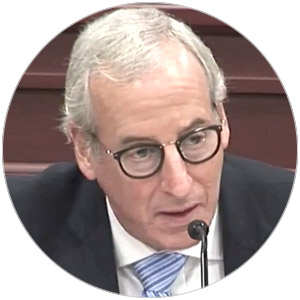
Cost Innovation Ideas Confront Stark Realities in Consolidated Health Care Markets
Penn LDI Virtual Seminar Focuses on Cost Commissions, Global Budgets and Public Option
News | Video
Appearing before the Pennsylvania House of Representatives Subcommittee on Health Facilities on October 4, University of Pennsylvania Leonard Davis Institute of Health Economics (LDI) Executive Director Rachel M. Werner, MD, PhD, testified about the impact that widespread hospital consolidations are having on the financial outcomes, quality, and access to care throughout the U.S. health care system. She was joined by Paula Chatterjee, MD, MPH, the LDI Director of Health Equity Research who spoke of the unprecedented market-level changes that have occurred in health care over the past decade, and the latest new hospital payment models designed to address the consequences of those changes.
Rep. Dan B. Frankel, D-Allegheny, Chair of the House Health Committee, opened the hearing by synopsizing his own concerns about the ultimate effects of health market consolidations that have occurred across Pennsylvania.

“Hospital consolidation and closures have been on my mind for more than a decade as I watched hospital systems, particularly those in my own backyard, acquire small, independent hospitals ostensibly to save them, but then closed the ones that were in less affluent neighborhoods and built more hospitals in wealthier neighborhoods,” said Frankel. “Although we’ve heard much talk about how consolidation results in lowering health care costs, the opposite has been the fact. We believe that the primary role of hospitals is to ensure access to safe care in our communities. I’m looking forward to learning how hospital financing and commercial transitions impact abilities to meet those goals.”
Werner, a health economist who has been studying the effects of health care payment and financing on quality and access to care for more than 20 years, delivered a succinct presentation that laid out both the vast size of the problem as well as its specific impacts on hospital operations and patient care to date.
“One of the most concerning trends that we see in health care markets today is decreased competition or market consolidation,” Werner told the hearing. “Consolidation occurs when hospitals merge, often within the same market and hospital mergers have been increasing over the past two decades. As a result, the number of independent hospitals in the U.S. has declined significantly. Consolidation decreases market competition and increases market power for the merged entities and the effects of this have been well studied. First, it’s quite clear that hospital mergers increase commercial healthcare prices. Price increases on the order of 20-30% are common and they can reach upwards of 50%.”

“It is important to recognize that the burden of these higher prices ultimately falls on patients through higher health care insurance premiums,” Werner continued. “Evidence on the effect of consolidation on hospital quality is more mixed, but by and large, it suggests that the quality of care is worse in highly consolidated markets compared to markets with more competition. Research has shown this to be true in the form of higher mortality rates, higher readmission rates, and worse patient experience of care after hospitals merge.”
“There’s less evidence about the effect of hospital consolidation on access to care. The evidence to date does not support the idea that mergers lead to closures, and in fact, the opposite may be true. Acquired hospitals may be more likely to remain open than had they not been acquired. But mergers may still affect access through other pathways. One such pathway is if hospitals selectively admit certain types of patients after a merger. One recent study found that fewer Medicaid enrollees were admitted to a hospital as markets became more and more consolidated,” Werner said.
Werner noted that private equity investment in health care was another major issue. “In the past decade, private equity firms have invested nearly $1 trillion through thousands of deals to acquire hospitals and specialized practices across the United States,” she said. “There are theoretical benefits to private equity investment in that it provides access to capital to support infrastructure improvements like systems and new facilities and it leverages economies of scale and managerial expertise to help improve efficiencies within hospitals.”
She said the growing influence of private equity across the U.S. health care system was concerning, “because of private equity’s focus on profits rather than patients and its short time horizon for return on investments.”
And she noted that private equity’s impact on regional consolidation is often occurring under the radar of the public or government regulations as the firms buy up individual provider practices in hundreds of transactions–each of which is too small to trigger the public reporting threshold. “This kind of increased consolidation will likely lead to increased commercial prices, with no positive effects on quality and potential deleterious effects on access.”
“While the evidence of negative effects of private equity acquisition on hospitals is limited to date, ongoing monitoring of these activities and their effects is vitally important given the profit focused motivation of private equity firms, which may not align well with the goals of improving patient health and outcomes or with investments in communities,” Werner said.
Chatterjee, whose own research focuses on financing, quality, and patient outcomes in health care safety-net facilities, focused her remarks on the federal and state programs that are exploring new ways to support financially stressed hospitals, particularly those in rural areas that are being affected by regional consolidation.

“The issue percolating between the lines of much of this hearing’s discussions is hospital payment systems,” said Chatterjee. “I’m going to go through four current policy options that have been brought up within the past five years that have either the implicit, or rather explicit goal of ensuring hospital financial viability.”
She went on to explain how four federal or state programs are testing alternative systems for supporting individual financially stressed hospitals:


Penn LDI Virtual Seminar Focuses on Cost Commissions, Global Budgets and Public Option

A Penn LDI Virtual Seminar Unpacks the Challenging Contradictions of this Continuing Trend

A Penn LDI Virtual Seminar Brings Together Top Financial and Health Care Experts

Penn LDI Experts Dispel Six Myths They Say Legitimize Bigger Systems
In The Media Yahoo! Money
Interview
Comparing community benefit when competition changes